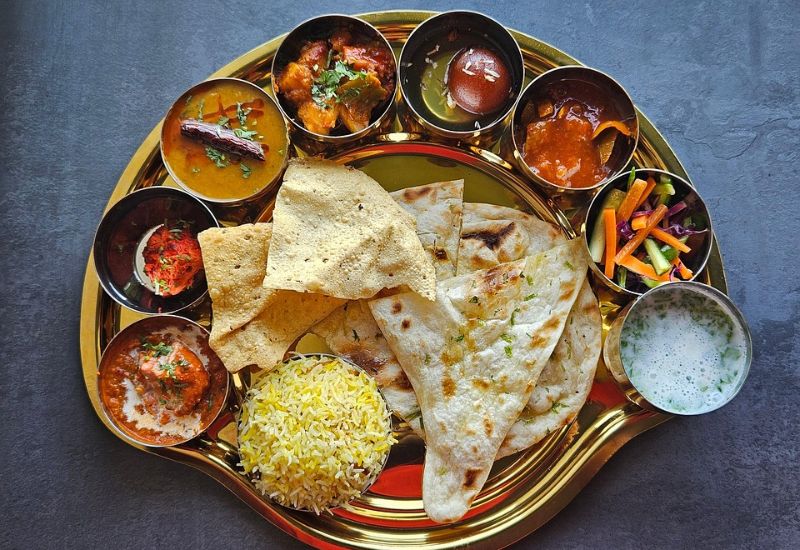Introduction
Food is more than nourishment; it expresses traditions, historical methods, and medical wellness perspectives. Human cultures worldwide have created flavorful food systems which combine delectable tastes with dietary and medicinal health advantages and proper nutritional balance.
Traditional worldwide cuisine combines fresh food components with natural spices and respectful eating traditions, leading to better health results for the body.
The blog examines the health benefits of global cuisines with a practical guide to using their benefits regularly.
The Health Benefits of Global Cuisines
1. Mediterranean Cuisine – The Secret to Heart Health
Science classifies the Mediterranean dietary pattern among today’s global healthiest eating plans. The dietary program includes olive oil, fresh vegetables, whole grains with lean proteins, and nuts to achieve heart health.
Benefits:
- Reduces the risk of heart disease and stroke.
- This eating pattern helps protect the brain and slows down mental functioning decline.
- Helps in weight management with balanced meals.
- The Mediterranean health benefits can enter your world by changing butter for olive oil, eating fish, and adding hand-sized portions of nuts to your diet.
2. Japanese Cuisine – The Key to Longevity
People who live the longest survive in Okinawa alongside various parts of Japan. The generous consumption of seafood combined with fermented vegetables green tea and fresh fish and vegetables supports Japanese people in maintaining excellent body health.
Benefits:
- Japanese food consumption helps reduce the chances of developing diabetes and cancer as chronic diseases.
- Consuming miso and kimchi with your diet creates excellent digestive system health.
- Including seafood, tofu, and fermented foods like miso soup and kimchi should become part of your diet to improve your daily meals.
3. Indian Cuisine – The Power of Spices
Even though spices impart character to Indian dishes, they also offer medicinal healing for human health. But the main agents-garlic, ginger, cumin, and turmeric-have their health benefits.
Benefits:
- Those taking turmeric enjoy it, as it boosts the body’s immune response.
- Ginger ingestion enables better digestion, but this compound is an anti-nausea agent.
- The combination of turmeric in soups with ginger hot water and cumin-spiced seasoning blends allows you to receive wellness advantages through delicious creations.
4. Thai Cuisine – A Balance of Flavor and Nutrition
Asian food culture includes Thai food as a nutritious eating experience which delivers outstanding flavours to its consumers. Thai cuisine results in a harmonious fusion between nutritious foods such as fresh herbs and lean proteins and coconut milk and spicy elements for great flavour.
Benefits:
- Lemongrass and galangal boost digestion and immunity
- The fats in coconut milk enhance mental operations and promote health benefits.
- The delightful connection between health and aesthetic pleasure awaits everyone who tries either raw papaya salad or Tom Yum Thai soup.
5. Mexican Cuisine – Rich in Fiber and Antioxidants
Alternatively, Mexican traditional cuisine bases its recipes on beans along with avocados, tomatoes, and whole grains to generate wholesome, nutritious dishes. Mexican food, as we know it, provides both dietary fibre and necessary vitamins and minerals to our bodies since we have eliminated fast-food options from our choices.
Benefits:
- The dietary benefits stem from the combination of legumes with corn because they supply protein and dietary fibre, which enhances digestion.
- You receive large amounts of heart-protecting fats to your body from consuming avocados.
- Assemble homemade tacos with salsa fresca, whole beans, and avocado to get a nutritious evening meal.
6. French Cuisine – The Art of Mindful Eating
Even though people automatically think of indulgence when they hear about French cuisine, the traditional eating habits in France actively support balanced and moderate food consumption. French people maintain good health by controlling their portions while using high-quality ingredients and relaxing eating experiences that help digestion in the long run.
Benefits:
- The practice of sectioning dishes aids food portion management, which reduces excessive food consumption.
- Emphasises fresh, whole ingredients over processed foods.
- You should attempt the French dining approach, which involves eating slowly to fully experience each bite and choosing smaller, high-quality portions of fresh food.
7. Korean Cuisine – Probiotic Power for Gut Health
The traditional foods of Korean cuisine consist of two fermented products: kimchi alongside doenjang, which comes from fermented soybeans, and kombucha, a fermented tea drink that supports digestive health and strengthens the immune system.
Benefits:
- Administered in limited quantities in this diet, these inflammatory foods do not harm the body’s cellular integrity.
- The dish has antioxidant properties from ginger, garlic, and hot red pepper.
- Combining these with foods that enhance natural digestive health is advisable.
8. Ethiopian Cuisine – High in Plant-Based Proteins and Fiber
Injera (a fermented flatbread) stands at the heart of Ethiopian cuisine, consisting mainly of lentils, chickpeas, and leafy greens, delivering a plant-based diet high in fibre. Ranging spices in dietary consumption support both digestion and metabolism function.
Benefits:
- Fat content in plant-based proteins supports human muscle tissue.
- Spices like berbere (a blend of chilli, garlic, and fenugreek) boost metabolism.
- Consumers should replace refined grains with teff grains utilised in injera preparation while adding more legume foods to gain protein and fibre benefits.
9. Vietnamese Cuisine – Light, Fresh, and Hydrating
Since Vietnamese gastronomy involves the use of light broth, fresh herbs, and miscellaneous nutritional ingredients, it is the signature of the health benefits of the world’s cuisines.
Benefits:
- Three ingredients, fresh basil, mint, and cilantro, are the active agents contributing to the antioxidant properties of herbs.
- The Pho soup has nutritious and healthy ingredients such as fresh vegetables, herbs, and lean meats, and at the same time, contains no processed sugar or fats that are harmful to health.
10. Greek Cuisine – A Natural Source of Healthy Fats
Greek cooking as a Mediterranean diet component includes generous amounts of beneficial fats together with lean proteins and natural plant components in its ingredients. The satisfying and nutritious nature of pho results from its combination of olive oil with yoghurt nuts and seafood.
Benefits:
- The consumption of olive oil enhances heart function while simultaneously minimising inflammation.
- Using Greek yoghurt provides excellent gut health benefits through its probiotic content.
- You should substitute fattening salad dressings with vinaigrette oil solutions while enjoying Greek yoghurt with nuts and honey as snacks and grilled fish as your protein source.
Savor Health and Flavor at Jonah’s Bistro

The international dishes at Jonah’s Bistro provide the optimal balance between nutritional richness and flavorful content.
All our hungry customers will find the Mediterranean heart-healthy fare and Indian spice adventures along with Japanese light-flavoured delights, which meet everyone’s needs. Experience the healthy international culinary realm by joining our healthy offerings.
Conclusion
Consuming global foods provides more benefits than flavorful enjoyment because they also contribute significant health advantages.
Several cuisines provide health benefits to the heart, as the Mediterranean diet does, while Indian spices supply dietary vitamins to the body. Multiple traditional eating patterns allow you to savour tasty food while obtaining better health through the benefits of global cuisines.
FAQs On Benefits Of Global Cuisines
1. What is the most nutritious eating style among international dining options?
People consider the Mediterranean diet the healthiest choice because it prioritises wholesome fats, whole grains, and fresh veggies.
2. Should I follow the benefits of global cuisine principles to improve the nutritional value of my meals?
You should add olive oil, whole grain foods, plenty of fresh vegetables, and disease-fighting spices from worldwide cuisines.
3. Are all global cuisines spicy?
Asian kitchens, including Thai, Indian, and Mexican cuisines, employ chilli and spices as primary elements. However, Japanese food and Mediterranean and European cuisines bring their dishes to life using herbs with moderate flavours.
4. What are some global superfoods?
Various international foods contain superfoods that deliver health benefits for the body:
- Mediterranean: Olive oil, nuts, fish
- Japanese: Seaweed, green tea, tofu
- Indian: Turmeric, ginger, lentils
- Mexican: Avocados, beans, tomatoes
5. Does following a budget-friendly plan for global cuisine mean possible financial opportunity?
Yes! Because of their widespread availability, you can obtain cheap rice beans and lentils.



